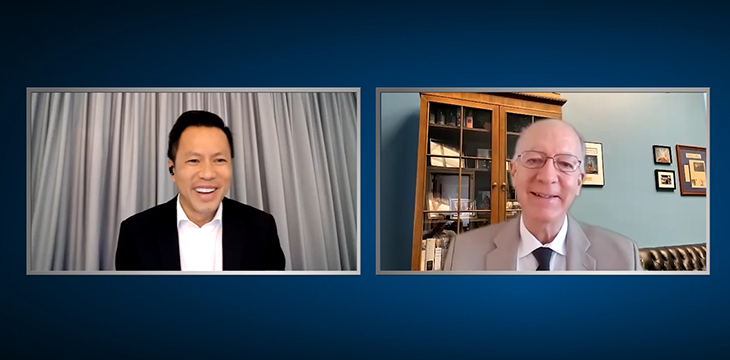|
Getting your Trinity Audio player ready...
|
Bitcoin Association Founding President Jimmy Nguyen interviewed U.S. Congressman Bill Foster for the latest Blockchain Policy Matters episode. He had some very interesting things to say about the role of the justice system in blockchain and in particular in cases where digital assets have been stolen.
It’s a topic that Foster has thought about a lot, after all. He’s the co-chair of the U.S. Congressional Blockchain Caucus and has evidently been thinking about how the law does, can and should react to blockchain and digital assets for a long time.
In this episode of Blockchain Policy Matters, our Founding President @JimmyWinSV speaks to U.S. Congressman Bill Foster about blockchain legislation and his work with the Congressional #Blockchain Caucus. https://t.co/C0x035cN7Z
— BSV Association (@BSV_Assn) August 16, 2021
In the interview, Nguyen asked Foster about the anonymity (or lack thereof) on blockchain, and in particular what the position should be in cases where coins have been stolen from their rightful owner. Foster was enthusiastic about the subject and took Jimmy’s hypothetical one step further:
“Well, and then there’s the more complicated situation where somebody steals your coins and then immediately the trickle onward. You know, there’s a very evolved set of laws on this. If you rob a bank with cash and then you go and stop at McDonald’s and buy a hamburger and then the cops come around later, the question is can they recover that cash from the McDonalds who received payment?”
Absent any knowledge that the funds being used to complete the transaction are stolen, McDonald’s of course wouldn’t be at risk of having to turn the money over—the responsibility lies with the thief. However, the answer is substantially different in instances where the recipient knows the funds are stolen.
This all seems intuitive and simple, because it is. However, judging by some of the responses to Dr. Craig Wright’s attempt to recover his own stolen coins, it apparently is not obvious to everyone. The criminal complaint launched by Dr. Wright will bear Foster’s hypothetical out if the hackers themselves are caught, but even if they aren’t, Dr. Wright knows where the coins are—that’s the beauty of the blockchain—and thanks to his landmark civil suits, so do the developers in charge of BTC, BCH, BCH ABC and BSV, who are currently the ones in control of that stolen property and who have the power to return it.
To some, the idea that these developers would revert the coins back to their rightful owner—as is within their power to do—is radical. To lawmakers such as Bill Foster, however, it’s relatively straightforward:
“It’s a very evolved set of law, and I think we’re going to need that in the crypto domain as well, because they’re very analogous situations.”
“If someone drags you into an alley, puts a gun to your head, says to ‘get out your cellphone and transfer all of your crypto assets to my cellphone’ and [they] immediately transfer them out, under what circumstances can you go to the police and a trusted court system and say, I want my money back or my crypto assets back? I think it’s something we’re going to have to face.”
Put this way, it’s tough to imagine on what basis any rational, law-abiding person could disagree with the idea that victims of digital asset theft should be able to seek redress. It doesn’t matter whether the mugger (or hacker) can be identified: if the victim can prove that their stolen property is being held in a locked room which happens to be controlled by a third party, the response from law enforcement is not to throw their hands up and lament that the door is meant to keep people out and it’s not for them to force the keyholder to open up. In that situation, not only would the courts have no problem forcing the keyholder to grant access, any resistance by the keyholder might make them a party to the crime directly, if not bring them within an ancillary crime, such as handling stolen goods (in the U.K., for example, a person is considered to be handling stolen goods if they assist in their retention knowing that they’re stolen).
The criminal component of Dr. Wright’s complaint is ongoing and of course separate from (but related to) his civil suit, which is made on the basis of duties owed by blockchain developers to their users. But the point seized upon by the Congressman can apply to almost any legal question posed by digital assets and blockchain: what does the law say? Laws aren’t designed to be comprehensive—they are to be adjusted, applied and extended to meet the demands of the situation.
While there are genuine gaps that need addressing, if you keep returning to this principle—that law is law—you’ll find that most of the noise around Dr. Wright’s litigation is just that: noise.
You can find episode four of Blockchain Policy Matters on Bitcoin Association’s YouTube channel.

 02-22-2026
02-22-2026 




